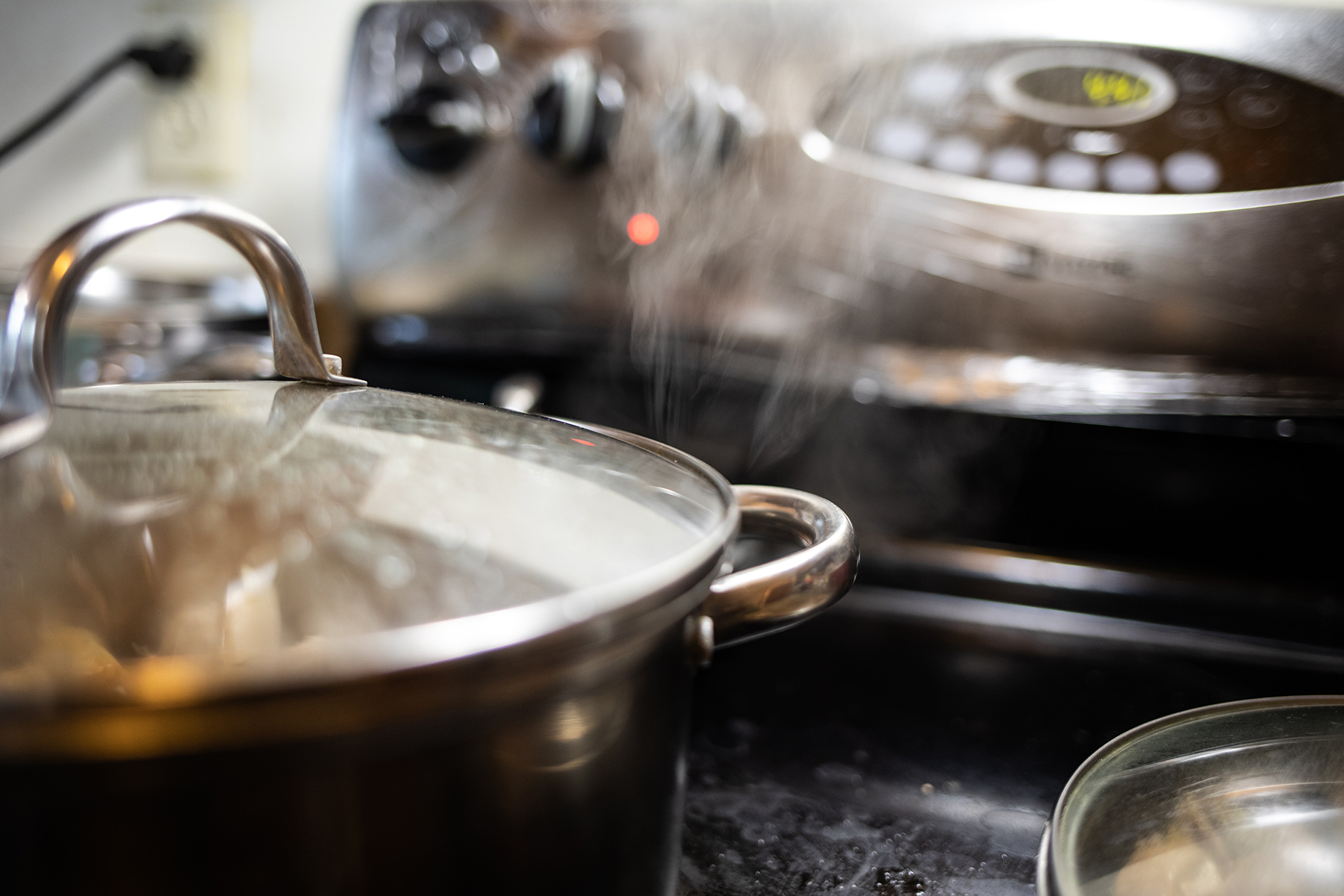We started eating Grits during the pandemic. It’s not that we’d never eaten them before, it’s just that it was a rare thing, a once-in-a-blue-moon kind of event. I think mostly, it was because we’d just plain forgotten they were an option. As was the experience for many people over the last 20 months, certain foods we’d once found plentiful at the grocery store, overnight became difficult, and even impossible, to find. Like many people, we took to making our own bread and getting creative with assorted canned goods when the shelves at our local grocery stores turned up empty of our usual favorites. This sudden forced creativity with mealtimes is where the Grits came in. They were available and adaptable. They are easy and inexpensive, and a single helping will leave you full for hours.
I re-introduced them one morning when I’d awakened with the inspiration and energy to make my family a large, sit-down breakfast. Usually breakfast around here is a non-event. It’s a catch-as-catch-can situation. If we do eat it, we opt for quick, easy, convenient options that require little effort and no waiting. But this particular morning, I decided on biscuits, bacon, eggs, and Grits. None of these menu items are particularly complicated, but when making them from scratch, they all take a little time.
The slow cooking one does in the kitchen—the kind that doesn’t involve a slow-cooking machine, but rather a physical presence and tending; the slow cooking that requires a steady stir, or a bit of kneading—offers space and time to reflect on the things that are circling the head or the heart. Stirring the Grits affords me a few minutes to come to Jesus with my questions and my anxieties. As I watch them transform from a dry powder to a silky white cream, I hand over one existential question after another, and learn again to accept that just because the Grits are ready, doesn’t mean I will leave the stove with any answers.
Transformation is slow and resists being rushed. Grits cooked in a hurry become rubbery and glue-like. They become waste. The same could be said of some of the half-baked answers we’re so quick to grab onto in our hunger for a resolution.
The refining of the last several months has raised all sorts of difficult questions, both within myself, and in the culture at large. We’ve seen and experienced things we cannot unsee or un-feel. Making space to have these conversations with God, whether it’s at the edge of the stovetop, or in the car with the radio turned off, helps us combat what author A.J. Swoboda calls “reflective poverty”, which is the spiritual stunting that happens in us as a result of our cultural resistance to making time and space in the regular rhythms of our lives for contemplation and reflection.
Swoboda, reflecting on the work of Andrew Sullivan, writes, “When we no longer have space to reflect, Sullivan suggests, we stop asking about meaning and the good life.”
When I read about this in Swoboda’s book, I nodded my head as if in confession for my own reflective poverty. This season in particular, the weight of many of my questions has sent me scouring every corner of every related book, podcast or article for answers. In my impatience I easily forget how the waiting for revelation—and learning to accept its absence—is also sanctifying. Easy answers are plentiful, thanks to the internet. I can solve twenty problems while stirring the Grits with one hand and consulting Google on my phone in the other. But it may well be that the answers we grab for in the moment are incomplete. Worse yet, they could be entirely wrong, inspiring all sorts of malformed conclusions and misdiagnoses in our minds. I hear the words of Mary Oliver: “things take the time they take.”
Hurry is a hazard in the kitchen, and it’s a hazard in life.
What I remember as I stir and converse with the Holy Spirit is that answers are less important than summoning the grit within, to ask about the scary or “forbidden” things that keep me up at night. Remembering that God is capable of handling our deepest everything, becomes its own invitation. But it’s an invitation one cannot receive when there is no space made to consider what it is one needs to ask most. The invitation is forsaken when we push for a solution rather than letting things take the time they take.
Swoboda remarks that many of the questions I’m asking are practically as old as time. They are neither new, nor original. He says, “What is new is our inability to sit and be refined by the questions over an extended period of time.”
There’s a nugget to ponder—never mind the answers, we can be refined by the questions. I imagine that this is part of God’s invitation when He says, “Be still and know that I am God” (Psalm 46:10). I realize that God’s invitation here is twofold. He invites us to reflect on what we know about His Kingship, which, if you give a mouse a cookie,[1] inevitably leads to the question—what don’t we know about God? Sitting with that question will transform us, if we’re patient enough to let it do its work.
These kinds of thoughts go round and round in my mind as the wooden spoon makes circles passing through the simmering Grits. I will sit down at the table with no new answers. We will spread jam and honey on the biscuits and talk about a variety of things, solving none of the world’s problems. I’ll know as I clean up the leftovers that God was as present at the table as any of us were. I’ll remember that the slow work has its own reward. We are full now. And still, we will need to eat again.
Ways to eat Grits
If you’ve never made and eaten grits before, there is no special skill needed to cook them, just do as instructed on the container. The only thing you need is a little patience and creativity. Grits by themselves are fairly plain but with a few extras stirred in, they might become a staple in your pantry. Grits offer a nearly blank-slate for add-ins, so play around with flavors and find what you like best. Our favorite way to eat them is with cooked bacon crumbles, shredded cheese, and a tablespoon of butter and a generous pinch of salt. My husband adds grape jam to his. I’ve also seen them prepared with jalapenos and cheese, with shrimp and a dash of cajun spice, or with another kind of fruit jam stirred in. Experiment with them–discover your favorite way to enjoy them.
[1] If You Give a Mouse A Cookie is a delightful children’s book by Laura Numeroff, in which the act of giving a kitchen mouse a cookie, sets off a chain of “if this, then this” events. Having read this book numerous times to my children when they were young, it is my go-to visual for those times when one thing leads to another…
The featured image is courtesy of Frank Zhang on Unsplash.
As a sequin-wearing, homeschooling mother of four, Kris is passionate about Jesus, people and words. Her heart beats to share the glorious truth about life in Christ. She’s been known to take gratuitous pictures of her culinary creations, causing mouths to water all across Instagram. Serving as an advocate for Compassion International, Kris is Managing Editor of The Cultivating Table for Cultivating. She is the author of, Come, Lord Jesus: The Weight of Waiting and Holey, Wholly, Holy: A Lenten Journey of Refinement, and Everything is Yours. Kris is the founder and host of Refine {the retreat}. She writes at kriscamealy.com.
Leave a Reply
A Field Guide to Cultivating ~ Essentials to Cultivating a Whole Life, Rooted in Christ, and Flourishing in Fellowship
Enjoy our gift to you as our Welcome to Cultivating! Discover the purpose of The Cultivating Project, and how you might find a "What, you too?" experience here with this fellowship of makers!


Add a comment
0 Comments